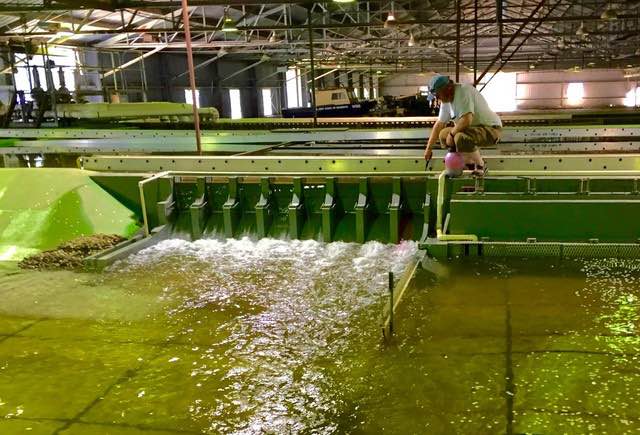forum
library
tutorial
contact

To Help Orcas Catch More Salmon,
Washington Plans to Increase Spill at Dams
by Courtney Flatt
Oregon Public Broadcasting, January 30, 2019
|
the film forum library tutorial contact |

|
To Help Orcas Catch More Salmon,
by Courtney Flatt
|
 In an effort to help imperiled salmon, Washington officials are proposing more water be spilled at dams during fish migration. The hope is that this would also increase the amount of food for orcas in Puget Sound.
In an effort to help imperiled salmon, Washington officials are proposing more water be spilled at dams during fish migration. The hope is that this would also increase the amount of food for orcas in Puget Sound.
Last year, state, federal and tribal officials came up with a plan to spill more water over the tops of dams during the spring. That would help young salmon migrating out to sea. At the same time, these flexible plans would keep hydropower costs low.
Washington's new proposal would bring the state's regulations in line with those plans. The state's plan would last for three years so that officials can test the effectiveness of the increased spill.
"As always, science is our guide and we need to balance the potential benefits to juvenile salmon without too great of risk to other fish," said Maia Bellon, director of Ecology, in a statement. "We want to be intentional and informed about any actions that significantly alter this complex ecosystem."
Increased spill is important to help salmon survive, said Joseph Bogaard, with Save Our Wild Salmon.
"What we've been doing to date to address the threats bearing down on endangered salmon and steelhead in the Columbia Basin have been inadequate," Bogaard said. "Increased spill is probably our best tactic to increase salmon survival in the near-term. It won't be enough over time, but it's certainly a step in the right direction."
Long-term, Bogaard said, the best way to ensure wild salmon survival is to remove the four Lower Snake River dams, a move federal judge Michael Simon ordered officials to put back on the table.
Washington's plans could result in more gas bubbles in the water spilled over dams. There are restrictions on what's known as total dissolved gas above dams. Washington's Department of Ecology monitor the gas levels. A department spokeswoman said the restriction above the dams helped officials know how much gas each dam was adding to the river.
The plan is drawing criticism from dam advocates. One of their arguments involves the possibility of more gas bubbles in the water. They say some fish could suffer from something akin to the bends, which afflicts scuba divers when they ascend too rapidly.
"The fish would get no rest in the amount of exposure (to total dissolved gas)," said Jim Litchfield, with Northwest RiverPartners, which represents agriculture and commerce groups that support dam operations.
Wild fish advocates say that's simply not the case. They say more spill is needed to help young salmon make it over the dams.
Washington Gov. Jay Inslee says this plan should help feed struggling orcas that mainly eat chinook salmon.
"Helping more juvenile salmon survive the journey to the ocean is one of many steps we want to take to protect and restore salmon. Our hope is this will also support the recovery and sustained health of our orcas," Inslee said in a statement. "This is an important short-term action we can take to help inform our decisions about what will work over the long-term."
learn more on topics covered in the film
see the video
read the script
learn the songs
discussion forum
